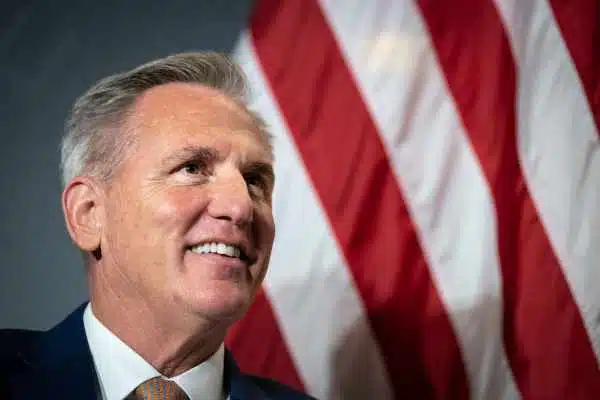by Gennady Shkliarevsky
The intensity of the drama over the debt limit is rapidly approaching its high point. The standoff between the White House and the Democrats, on one hand, and the House and the Republicans, on the other, is now in the mode of a full-fledged conflict with the potentially disastrous consequences for the country.
The negotiations between President Biden and the leadership of the House that took place last Tuesday ended with no results, except for the promises to keep talking. When Mr. McCarthy emerged from the meeting with Mr. Biden, he told the reporters in frustration: “I’ve done everything in my power. We have passed a bill that raised the debt limit. Now, I haven’t seen that in the Senate. So I don’t know.”
Biden and the Democratic leaders wasted no time after the disappointing meeting and immediately began to criticize the Republicans. A day after the meeting on the debt, the president assailed “extreme” Republicans who, he said, had “taken control of the House.” Biden also began to woo Republicans in an effort to split the party (not a friendly gesture).
Appearing in a competitive suburb with Republican Congressman Mike Lawler sitting in the front row, Biden accused McCarthy of radicalism at the behest of the Republican “extremists.” Biden did not miss an opportunity to invoke the name of Donald Trump before a pleasing crowd.
The Democrats continued to reiterate the main point of their proposal: to take the debt limit off the table and then negotiate the budget. On Wednesday, Biden offered an olive branch—sort of. He put on the table the unspent part of the stimulus package.
The Democrats also now propose to discuss limiting federal discretionary spending for the next two years. The proposals they now consider include streamlining the permission process for developing energy sources, including oil and gas is not under. Senator Schumer has also softened his position somewhat. “We have to sit down and figure it out,” he said, how to reduce the budget. However, Schumer held fast to the main Democratic line on the debt repeating his party mantra that “taking default off the table would be the best thing to do right now.”
Biden and the Democrats now discuss the option that the Democrats have mulled over for some time. The idea is that the president can use Section 4 of the 14th Amendment and raise the debt ceiling unilaterally. Invoking the 14th Amendment that stipulates that the validity of the public debt should not be questioned is an untested approach that is fraught with inevitable and lengthy litigation at the time when the pressure for ending the debt crisis is on the rise.
Biden has indicated on several occasions that he will be looking at this option very carefully. Speaking to reporters on Tuesday, Biden repeated that he was “considering the 14th Amendment.”
The approach that centers on the 14th Amendment looks at the problem of debt primarily from a constitutional point of view. The idea of using the 14th Amendment is rapidly gaining traction among the Democrats who are getting increasingly impatient with the gridlock over the debt. In his recent op-ed in The New York Times Lawrence H. Tribe— who advises Mr. Biden and whom Mr. Biden, by his own admission, greatly admires— has forcefully argued in support of this approach. In his view, this course is constitutionally sound. In his view, it does not represent an overreach on the part of the president.
Biden and the Democrats argue that the plan they propose is in the interests of the American people. In fact, they claim, it is the only plan available now that serves public good; and they never miss an opportunity to portray the Republicans as the spoilers for the American people.
A solution that serves public good can only be valid if it is based on a comprehensive and inclusive approach that takes into account all aspects of the problem at hand. Those who make such claim commit themselves to viewing the problem from all sides. Only an inclusive and comprehensive solution can be objective and serve the interests of the public.
The debt problem is not exclusively legal and constitutional, as the Democrats try to present it. The debt problem has important economic and political dimensions that are no less and probably even more important than the constitutional one. In fact, debt problems originate in economic problems. In order to solve the debt problem, we have to address the economic problems that create it.
The reason for the uncontrollable growth of the American national debt is first and foremost due to the fact that our economy is wasteful and inefficient. Our economy does not do what economies must do; it does not create wealth and consequently does not grow. In fact, our wealth declines. The enormous size of its monetary valuation is not a result of value creation; it is a product of inflation. That’s the main reason why we have to borrow more and more money. You cannot fool money. If you do not create wealth, the value of money that is equivalent to the value of your economy diminishes. For this reason, you have to borrow more and more and more; and the money you borrow gets cheaper and cheaper and cheaper.
The Democrats pretend that this borrowing is infinite. In fact, it is not. When wealth declines, the monetary value equivalent of this wealth also diminishes. In order to sustain an economy of declining wealth, you have to borrow more devalued money; and devalued money brings higher prices and inflation. That’s what we have in America today. When our government sells bonds, it sells bonds that have less and less value. Eventually, those who are in the dollar zone, use dollar as their exchange currency, and buy American bonds are getting less and less when they buy them.
You can fool some people some of the time, but you cannot fool all people all the time. When finally people figure out that they are cheated, they will leave this Ponzi scheme. In fact, a number of countries have already left or are in the process of leaving. They begin to rely on alternative international exchange currencies instead of American dollars. More dollar users will leave the dollar zone if we do not seriously address the debt problem and keep on sweeping it under the rug. That’s the economic aspect of the debt problem.
The only way out of this mess is by creating wealth and increasing productivity. The Democrats propose to increase taxes on the wealthy and large corporations. How is this going to increase wealth if those who know how to create wealth are not able to invest?
The Democrats practically do not talk about the political aspect of their proposed solution, evidently because talking about it is extremely inconvenient for them. Despite all the sugar coating, the result of accepting the Democratic proposal will be bitter if not deadly for the Republican Party. The debt limit is the main trump (pun unintended) card they have to negotiate on equal terms with the Democrats. Without this card, they will be at the mercy of the Democrats. If they agree to the demand of moving the debt issue off the table, they will practically give the Democrats the gun that the latter can hold to their head.
The loyal followers of the Republican Party demand that accepting spending cuts should be tied to the debt ceiling. If the Republicans do not honor their promise, their followers will leave in disgust. They will abandon the Republicans to their inevitable fate. Their departure will effectively spell the end of the Republican Party. It may also end American democracy. In short, this move will be suicidal.
The Democratic take-it- or-leave-it approach offers the Republicans no choice but to resist. If the Democrats do not want a default, as they assure us, they must agree to discuss the debt issue without any preconditions. All the more so, since the Republicans have clearly stated their determination to prevent the default.
The Democrats and the liberal media relentlessly portray the Republicans as spoilers for the American people who do not care about their country but think only about their political advantages. This is not true. Indeed, the Republican proposal will limit some options for the Democrats, but it does not render them impotent. One certainly cannot and should not view Republicans as virtue incarnate—far from it. They are not angels in human flesh. They are not immune to partisanship. Their proposal has flaws. It is mediocre, but it is not awful like the Democratic proposal.
For one thing, the Republican proposal will save $5 trillion, as opposed to $3 trillion in the Democratic proposal. $2 trillion is not much, but it is nothing to sneeze at either. The Republican proposal keeps taxes low, which means that those who know how to create wealth will be able to invest. However flawed the Republican proposal may be, it will not be disastrous for America and its allies. The Republican act in good faith. They leave room for the Democrats to remain a legitimate and effective party.
By contrast, the Democratic proposal is exclusionary and one-dimensional. It serves primarily the political interests of the Democratic Party. As Biden has forcefully stated in his comments to the press after his meeting with McCarthy, the Democrats are determined to reject the tax cuts advocated by the Republicans. These tax cuts are central to the Republican agenda and they are also central to the recovery of American economy.
Biden has also indicated that the Democrats are going to pursue their green agenda. It is pretty clear that the Democratic Party will not even consider negotiating these important points. If the Republicans will agree to move the issue of the debt off the table, they will have no leverage against the Democrats who will definitely stall the adoption of the budget and will put the blame on the Republicans for disrupting the government.
The most important point, however, is that the Democratic proposal pays no attention to the two important aspects of the debt problem—economic and political. It is exclusive, subjective, and arbitrary. It cannot possibly serve the public good because it excludes a significant part of the public. If the Democrats succeed in winning this fight on their own terms, their party will come out as a winner-take-all. The victory of the Democrats will spell the end of American democracy and the ultimate emergence of the United States as a one-party state.
~~~
Gennady Shkliarevsky is Professor Emeritus of history, Bard College







I wonder about this: The reason for the uncontrollable growth of the American national debt is first and foremost due to the fact that our economy is wasteful and inefficient. Isn’t the debt directly caused by congress? That is not our economy. Congress does not produce a legally required annual budget. Aren’t tax revenues at a peak, in terms of… Read more »
The Real Problem is the Federal Reserve System. Banks actually make money when there is controlled Inflation because US Government Bonds are supposed to be the most stable investment in the World. When there is uncontrolled inflation, Banks lose money on Bonds. This is the Danger of a Zero Asset Reserve Fiat Money System. The FED kept interest rates too… Read more »
Biden and the Democrats are going to lose this battle Biglee. This time, The People are for cutting the Budget because they know it’s been the excess Government spending that is Fueling Inflation and destroying their lives. Biden thinks in the Mayhem he is about to cause, he will win. Whatever that means. I think it will get him Impeached.… Read more »
Your wish list is totally acceptable. The reality may be different. The Republicans need to unite and resist. The fate of their party and America depends on it.
There are too many ‘greedy’, power hungry, despicable creatures in the political arena salivating ‘on the prospect of proceeds’ of an open ended budget and the unlimited kickbacks this would ‘afford’…an entire corrupted MSM, that is indoctrinated and or stupid and or both, without ‘cojones’, running interference for the ‘ghouls’…notice the ‘dodo’ is suddenly paying a ‘wee bit’ of attention… Read more »
I agree with, John. But what choice do we have? We must act.